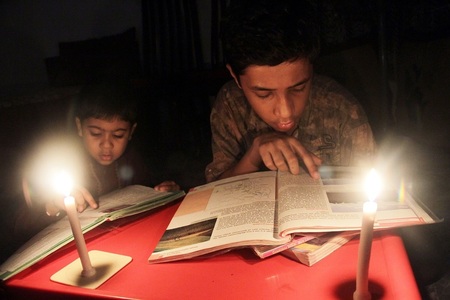ISLAMABAD: The increase in loadshedding — even during Sehr and Iftar — has not gone unnoticed as the National Electric Power Regulatory Authority (Nepra) has taken up the matter against the National Transmission and Dispatch Company (NTDC), blaming it for not addressing systemic bottlenecks despite large investments authorised by the regulator.
Former prime minister Shahid Khaqan Abbasi of the last Pakistan Muslim League-Nawaz government had approved a load management plan for the month of Ramazan, and announced that there would be no loadshedding during Sehr and Iftar, even in areas where losses and non-recoveries are higher than 80 per cent.
To ensure that nobody faced electricity outages, the previous government announced two shifts of uninterrupted power supply. The first, a three-hour period during Sehr time, and the second, a four-hour shift starting at Iftar and ending after Taraveeh. The policy, according to the government, would be extended to even those areas that had more than 80pc in losses. All industrial consumers were asked to adjust their labour shifts accordingly.
Power regulator cautions problem may worsen in the coming months
The plan worked well for the first few days and the power division declared that it had even restored full supply — to one category — of industrial consumers as there was sufficient power generation.
However, some major cities began to witness extended periods of loadshedding, besides unscheduled power cuts that continued regardless. The authorities said that constraints in the system had appeared as power generation from the south of the country had been moved to the north — as hydropower generation had dropped due to water shortage.
Rawalpindi, Islamabad, Lahore and some other cities, however, witnessed extended breakdowns, as power cuts during Sehr and Iftar continued.
The power regulator on Friday said it was worried over the increase in loadshedding in the country and found that the overloaded grid stations of the NTDC were the underlying cause of the breakdowns.
“The NTDC’s grid stations have suffered extensive overloading, specifically in the service territories of Islamabad Electric Supply Company Limited (IESCO), Lahore Electric Supply Company (LESCO) and Peshawar Electric Supply Company (PESCO)”, said the regulator, adding that the over loading has caused distribution companies (DISCOs) to resort to loadshedding to relieve overloading at the 500kV Rewat, Sheikhupura, Gatti, Multan and Shikarpur grid stations, and the 220kV Burhan, New Kot Lakhpat, Kassowal, Mardan, Bannu, Vehari, Muzaffargarh and Hala Road grid stations.
The regulator said that it had sanctioned an investment of Rs96.63 billion in the NTDC in the last three years (i.e. fiscal year 2014-15, 2015-16 & 2016-17) for the improvement of the transmission network. “However, the NTDC has failed to improve its network”.
“Repeated power breakdowns, persistent overloading of the NTDC grid stations, delay in projects (transmission lines & grid stations), power evacuation issues from power plants and additional 4-5 hours’ loadshedding by Discos on account of the NTDC’s system limitations indicate a poor state of affairs,” the regulator held and alleged that the NTDC has also failed to intimate information regarding the constraints in its network to the regulator, as required by the law.
The regulator had previously taken notice of the failures of the NTDC and had directed the system operator on Nov 20, 2017 to resolve the issue of overloaded grid stations.
However, the issues with the NTDC’s network remain unsettled. Problems may be further aggravated over the next few months — given the increased demand over July and August — if immediate measures are not taken, the regulator said. It directed the NTDC to prepare and implement a plan for eliminating overloading and network problems.
Despite the government’s announcement of zero loadshedding during Sehr, Iftar and Taraveeh, un-scheduled power cuts have continued, largely because of the NTDC’s outdated transmission and distribution system.
At a recent event, Iesco management had stated that the NTDC was responsible for the ongoing loadshedding. The management claimed that Iesco itself, had enough power in the system to provide uninterrupted electricity.
Published in Dawn, June 9th, 2018













































